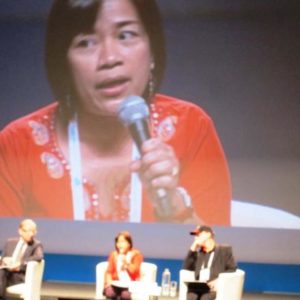Maria Theresa Lauron, a water activist from the Philippines, strode across the stage at the World Water Forum and took a seat next to one of the most powerful men in the global corporate water industry: Gérard Payen, President of Aquafed, the private water trade association.
Lauron was invited at the last minute to debate Payen on the merits of public versus private water systems at the Forum — a corporate trade show that provides the water industry access to the policymaking process. Knowing how high the stakes were, she had prepared her case all night using Corporate Accountability International’s recent report documenting the devastating impacts of water privatization as her “bible.”
“Sometimes, truth is stranger than fiction,” she began, gripping her microphone with sweating palms. And as she described the desperate situation faced by millions of Manila residents since the World Bank orchestrated the private takeover of Manila’s municipal water systems, her voice grew steady and strong:
- Hundreds of thousands of Manila households lack 24-hour water service, despite a promised $7.5 billion in infrastructure investment.
- Water quality has plummeted, with 600 residents sickened and eight killed from high E. Coli levels.
- Rate hikes of over 600 percent have rendered clean, running water — the most essential resource for survival — unaffordable.
In the face of this bleak picture, the president of Aquafed responded with a shrug of his shoulders, spouting standard industry talking points: consumers, not governments, must shoulder the full costs of water infrastructure. “No money, no water,” he said. Case closed.
Lauron seized upon Payen’s response, agreeing that in a privatized system, water certainly flows to where the money is. But she won’t stand for this violation of basic, human rights. One of many dedicated activists working tirelessly on this issue, she seeks to make sure everyone in her country — regardless of ability to pay — has access to clean, safe water.
A lifetime of speaking truth to power
Lauron, or “Tetet” as she is affectionately known, is no stranger to taking on powerful corporate interests. Her long history of mobilizing grassroots change began over 20 years ago as a student protesting tuition hikes and oil deregulation. Today, she’s a fierce advocate at IBON International, an international social justice organization.
Though Tetet faces an uphill battle, she’s determined to rally Manila’s residents to reclaim their human right to water. She’s constantly on the road, organizing protests, launching petitions and educating tens of thousands of Filipinos who live in poverty about their basic rights.
A key ally in Corporate Accountability International’s campaign to halt the global corporate water grab, Tetet has told the true story of the World Bank’s takeover of Manila water to the press, to the United Nations and on the world stage at the World Water Forum. She is unflagging in her efforts to compel the World Bank to cease financing water profiteering and instead support local, democratic control of the tap.
Filipino society protests private schemes
In 1997 the World Bank advised the Filipino government, designed the plan to privatize Manila’s water systems and even conducted bidding for the resulting private contracts. Since then, a broad swathe of Filipino society has risen up in protest. Everyone from elected and church officials to labor unions to farmers have testified to the brutal consequences of the water crisis in the city. Yet the Bank consistently touts Manila water as a poster child for success.
Today, the human toll of privatization persists. During a recent drought made worse by the private mismanagement of Manila’s water infrastructure, the people of the metropolitan area were left without water for weeks. In the end, dozens of outraged residents took to the streets to crack open pipes, fill their empty pails and bathe.
Though real change is yet to come, Filipinos remain determined to challenge corporate water profiteering. A new government scheme to privatize water across the country was recently leaked, leading to eruptions of mass protests: from municipal workers staging rallies in anticipation of layoffs and rate hikes, to local fishermen demonstrating against government plans to seize Laguna de Bay and ban its use as a traditional fishing zone.
Work has far-reaching implications
But Tetet’s struggle isn’t just about safeguarding public water in Manila — it has broad implications for millions of people around the world. The World Bank continues to market Manila’s water privatization as a flagship model across the Global South, from India to Tanzania.
And, it continues to seek the expansion of Manila Water Company, one of the corporations that privatized Manila’s water systems, and in which the Bank has a financial stake. Indeed, Manila Water Company has ballooned into a transnational force, with contracts in India, Vietnam, and most recently, a controlling share of the privatized utility in Jakarta, Indonesia.
To counter the Bank’s misleading public relations and support democratic control of water over corporate profits, Corporate Accountability International will keep supporting Tetet’s work and ensure her story — the real and devastating story behind the private takeover of Manila’s water — is heard.
“It’s tough,” Tetet says, “but I can’t imagine doing anything other than this work. It’s but a drop in the bucket in the journey towards social transformation.”



